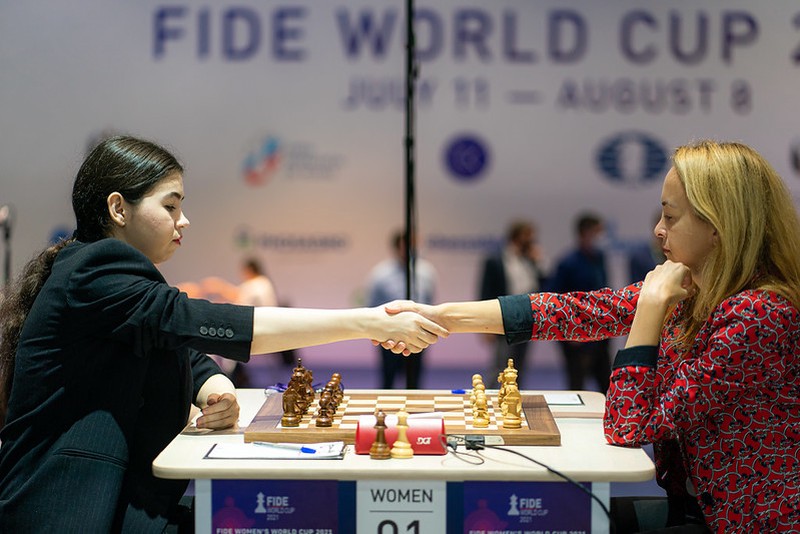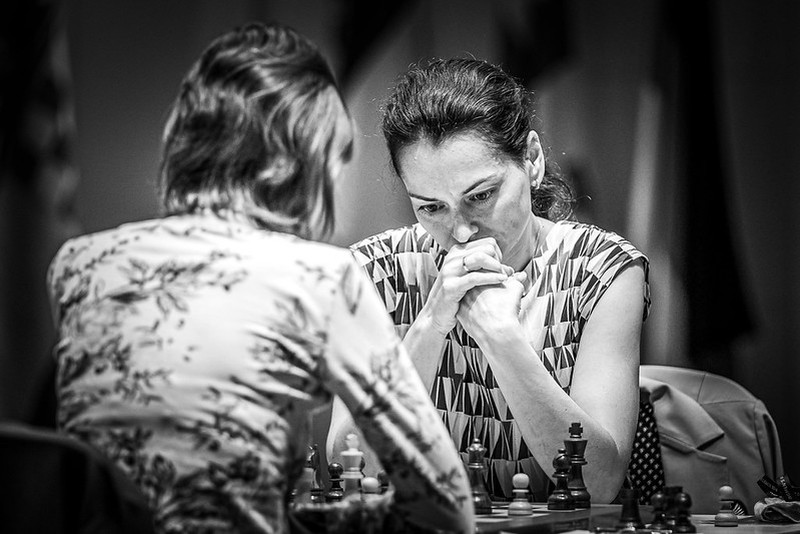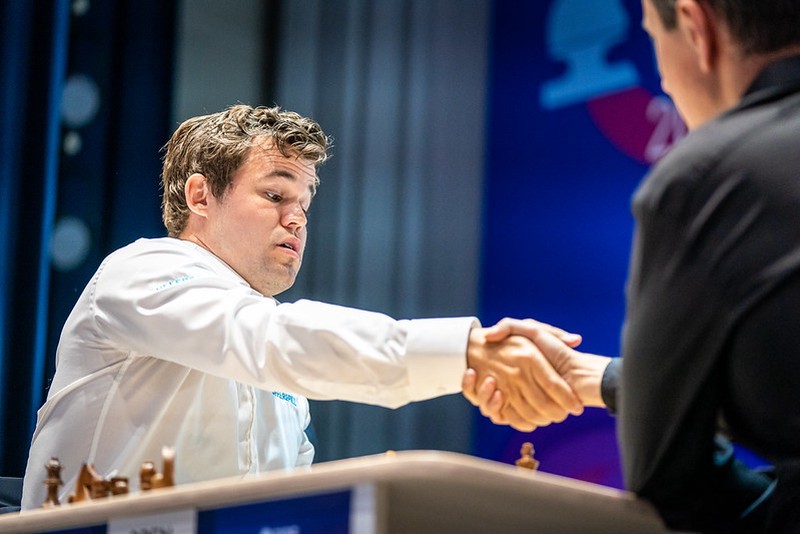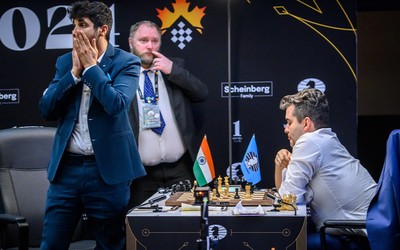
FIDE World Cup - Round 4 Report: Dubov, Andreikin, and Artemiev Whittled Down
With 32 players left in the Open World Cup, and 16 players in the Women's edition, there's everything to play for - especially as many of the world's strongest players were eliminated in round 3.
[title image: Anastasiia Korolkova / FIDE]
But round 4 was not without its surprises - such as Polish GM Radosław Wojtaszek (2691) making World Champion GM Magnus Carlsen (2847) look human in their encounter - forcing the best player in the world to an edgy tiebreak decider.
The young Serbian GM Velimir Ivić (2582) , also continued his meteoric progress through the tournament. Ivić, who had already bested GM Francisco Vallejo Pons (2710) in round 2, followed by GM Matthias Blübaum (2669) in round 3, toppled established GM Dmitry Andreikin (2724). Andreikin, a two-time Russian champion, Grand Prix winner, and runner up in the 2013 World Cup, was unable to get the better of Ivić in their classical encounters and lost the second tie break game.
Meanwhile in the Women's World Cup, GM Aleksandra Goryachkina (2596) was also wobbled by veteran GM Antoaneta Stefanova (2463) who beat her in game 1 to force the match to tie breaks.
Likewise, GM Nana Dzagnidze (2523) won on demand against Russian Vice Woman Champion IM Polina Shuvalova (2489) - forcing their game to go to the tie break deciders.
Russia continues to be performing particularly strongly in both the Open and Women's World Cup - 5 of the 16 players advancing to round 5 in the Open, and 4 of the 8 players advancing in the Women's play under the Russian flag. In the Open, France and Poland are both doing well, with each country sending two players to the final 16 (GMs Maxime Vachier-Lagrave, Étienne Bacrot, Kacper Piorun, and Jan-Krzysztof Duda).
Round 4, Game 1 - Open:
Sparks flew in a battle between GM Étienne Bacrot (2678) and GM Pavel Ponkratov (2629) in a wonderful clash of styles. Both players, known to produce more fighting and aggressive chess, met in controlled disorder. Whilst the engine nearly always preferred white, the position was unclear until Bacrot benefitted from a misplay after 25. Ne5 Rxb2. Taking home the point remained challenging in an unbalanced position allowing for counterplay from both sides, but Bacrot navigated the waters to take home the full point in an exciting and dramatic game.
Endgame specialists everywhere will have been overjoyed with the display put up by Iranian number 3, GM Amin Tabatabei (2613) against Indian number 2, GM Pentala Harikrishna (2730). Starting with a Queen's Gambit Accepted, the game largely looked drawish until the key position at 32. ...bxc6? - where, in a pawns and knights endgame, Tabatabei found the winning move.
There's only one move to make this a winning endgame for white - can you find it?
Over the next 10 moves, Tabatabei allowed the position to simplify into one he recalled as being identical to another game he had studied and knew was a winning position. After his win, Tabatabei was kind enough to share with Lichess his thoughts on the game:
Round 4, Game 1 - Women:
A surprise result as GM Aleksandra Goryachkina (2596) seemed to make a rare miscalculation, allowing GM Antoaneta Stefanova (2463) , a former Women's World Champion to win a whole piece. Goryachkina - the sixth woman to break 2600 - played on with some hopes her opponent may at least equalise the position. But Stefanova's experience was too great to make any oversight - and Goryachkina resigned around 20 moves later.

(image credit: Eric Rosen / FIDE)
Other than IM Polina Shuvalova (2489) versus GM Nana Dzagnadze (2523), which produced a win for the promising young Russian IM, all other games in the Women's World Cup resulted in draws, for a potentially explosive game 2.
Round 4, Game 2 - Open:
GM Maxime Vachier-Lagrave (2749) was the first to finish game 2, and did so in style, eliminating Indian prodigy GM Rameshbabu Praggnanandhaa (2608) from the tournament with a positional queen sacrifice. As Vachier-Lagrave clarified in an interview with Lichess after the game, his greater coordination of pieces as well as advanced passed pawn were a powerful and unstoppable combination. Vachier-Lagrave will benefit from a rest day, before facing GM Sergey Karjakin in round 5.
https://youtu.be/V1BFsJ4yb-s?t=14357
5-times World Champion in Solving, GM Kacper Piorun (2608) , eliminated Uzbek prodigy GM Javokhir Sindarov (2558). Piorun, who in the previous round had eliminated GM Jorden van Foreest, held Sindarov to a draw in game 2 having previously beaten him after a few misplayed moves by Sindarov in game 1. Piorun - who will now be facing GM Étienne Bacrot in round 5 - was kind enough to share his thoughts on his games in an interview with Lichess:
https://youtu.be/V1BFsJ4yb-s?t=13103
However, hope continued for Uzbekistan with GM Nodirbek Abdusattorov (2634) who won on demand with black after a gruelling 5-hour slog against GM Vasif Durarbayli (2625). Both players will be heading to the tie breaks to decide who goes through.
Round 4, Game 2 - Women:
After six draws the previous day, game 2 was as explosive as predicted, culminating in six decisive games (although not the same six!)

(image credit: Eric Rosen / FIDE)
Russian legend GM Alexandra Kosteniuk (2472) exchanged both her rooks for three minor pieces against GM Mariya Muzychuk (2550), in a dynamite game. With greater piece activity, coordination, and development, Kosteniuk was able to overwhelm her opponent's kingside, making an eventual checkmate inevitable:
White resigned here - can you spot the mate in 7
With the win, Kosteniuk secured her place in round 5 of the Women's World Cup - joining compatriot GM Valentina Gunina, as IM Polina Shuvalova and GM Aleksandra Goryachkina fought to remain in the event.
After losing game 1 top seed GM Aleksandra Goryachkina fought back valiantly against GM Antoaneta Stefanova to stay in the tournament. Creating a strong centre and then bringing her kingside pawns into the fray, Goryachkina was able to create a chain of unstoppable passed pawns, securing her the win to go through to the tie breaks.
Round 4, Tie-breaks - Open and Women
There was excitement across both the Open and Women's World Cup as several top players found themselves in slightly sticky situations.
GM Radosław Wojtaszek (2691) forced World Champion GM Magnus Carlsen (2849) through his paces, but in the rapid play tie break, Carlsen was able to comfortably secure a draw with black in the first rapid tie break. With colours reversed, Carlsen achieved an early advantage before applying his famous endgame technique to secure the win and go through to round 5.

(image credit: Eric Rosen / FIDE)
After two sizzling classical length games with a win apiece, GM Étienne Bacrot (2678) clashed with GM Pavel Ponkratov (2629) in another two feisty rapid games. Bacrot had chances in the first rapid game, with the black pieces but in time pressure held a comfortable draw despite some winning chances. With the white pieces, Bacrot steamed ahead out of the opening and only grew his winning position. The former prodigy and previously youngest ever grandmaster joins his compatriot, GM Maxime Vachier-Lagrave into round 5 - but given the brackets they are in, they would only meet in the final.
Meanwhile, established GM Dmitry Andreikin (2724) could not best the young dark horse, GM Velimir Ivić (2582) in the rapid tie breaks. Ivić held Andreikin to two draws in the classical portion, before comprehensively defeating Andreikin 2 - 0 in the rapid tie breaks. Ivić, a Serbian prodigy who must be severely underrated in both classical and rapid (with a 2324 rapid rating) chalks up another super-GM (a grandmaster with a rating over 2700) scalp after defeating GM Francisco Vallejo Pons in round 2.
GMs Alexander Grischuk, Sergey Karjakin, Andrey Esipenko, and Vasif Durarbayli stay in, knocking out Anton Korobov, Vladislav Artemiev, Daniil Dubov, and Nodirbek Abdusattorov respectively.
In round 5 of the Open, some really exciting chess is on the cards, with games between GMs:
Magnus Carlsen (2847) v. Andrey Esipenko (2716)
Étienne Bacrot (2678) v. Kacper Piorun (2608)
Alexander Grischuk (2778) v. Jan-Krzysztof Duda (2738)
Santosh Gujrathi Vidit (2726) v. Vasif Durarbayli (2625)
Velimir Ivić (2582) v. Vladimir Fedoseev (2696)
Haik Martirosyan (2632) v. Amin Tabatabaei (2613)
Maxime Vachier-Lagrave (2749) v. Sergey Karjakin (2757)
Peter Svidler (2714) v. Sam Shankland (2709)
All of the games for the Open World Cup will be shown on Lichess,here.
In the Women's World Cup, GM Aleksandra Goryachkina got revenge on GM Antoaneta Stefanova for the loss in game 1, beating her 2 - 0 in the rapid tie breaks. GM Nana Dzagnadze maintained pressure on IM Polina Shuvalova, and despite an early series of draws, the time pressure appeared to get to Shuvalova, with Dzagnadze securing a needed win to go through.
There was a similar story for IM Dinara Saduakassova (2483) who bested her opponent, IM Alina Kashlinskaya (2488) after an initial round of draws. In the second rapid tie break - where the time control shrinks to 10+10 as opposed to 25+10, Saduakassova was able to edge a lead and keep it, to secure her place in the quarterfinals.
The Women's World Cup quarterfinals - much like the Open World Cup - has some really exciting chess on the cards, with many interesting match ups:
GM Aleksandra Goryachkina (2596) v. IM Dinara Saduakassova (2483)
GM Nana Dzagnidze (2523) v. GM Anna Muzychuk (2527)
GM Alexandra Kosteniuk (2472) v. GM Valentina Gunina (2437)
GM Zhongyi Tan (2511) v. GM Kateryna Lagno (2559)
All of the games for the Women's World Cup will be shown on Lichess, here.
More blog posts by Lichess

Round 14: Gukesh and Zhongyi are officially the World Championship Challengers
A historic finish to the FIDE Candidates, as 17 year old Indian prodigy becomes the youngest World C…
Candidates Round 13: Gukesh takes the lead, Zhongyi pulls ahead
A massive day for the 17 year old Indian, as his chances to win the Candidates skyrockets, as Zhongy…
Candidates Round 12: Three-ways Tie in Open, Tan Maintains her Lead
Nakamura and Gukesh catch up with Nepomniachtchi in Open, while Tan maintains a safe distance from e…
